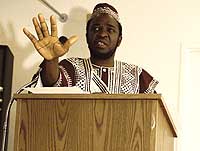|
A
year later, campus Muslims still strive to dispel lingering,
negative stereotypes
Muslims at TCU and in the community
say they have been educating Americans about their faith
since Sept. 11.
By Sarah
McClellan
Photo Editor
Yushau Sodiq has had to answer questions such as, “Why
are you Muslim?” and “Are you one of them?”
since the attacks on the World Trade Center and the
Pentagon on Sept. 11, 2001.
“(The attacks) created a lot of curiosity,”
said Sodiq, an associate professor of religion. “I’ve
been asked why I belong to this group, and I have to
answer that the people that did that are Muslims, but
they are criminals. They did something wrong —
something that was not Islamic.”
During the past year, Muslims in America have begun
to realize the growing need to educate the public about
their faith.
Imam Moujahed Bakhach of the Islamic Association of
Tarrant County said he has visited churches, universities
and synagogues to talk about the principles of Islam
and dispel the negative images of the religion seen
on the news.
“People heard a lot on the media and it made them
wonder, ‘What is the Islamic faith?’”
Bakhach said. “It’s not right (for the media)
to put the Islamic faith on the spot.”
The Islamic Association of Tarrant County held an open
house Saturday to help inform people about Islam. The
event included two lectures that outlined the basic
points of Islam and members handing out Islamic literature
and personally explaining the religion to visitors.
“The Muslim community needed to get more involved
with the Fort Worth community,” Bakhach said.
Muhammad Islam, president of the Muslim Student Association,
also said people asked a lot of questions after the
attacks.
“It’s natural that people ask a few questions,
but my friends were cool about it,” Islam said.
“(The attacks) changed my life as much as anyone
else’s. I don’t see any relationship between
Islam and what happened on Sept. 11.”
Tahira Hussain, a senior political science major, said
the TCU community was supportive and she experienced
no prejudice as a result of the attack.
“I have friends at International Student Services,
and they were very caring because (international students)
are their concern,” Hussain said. “They were
worried people would treat me differently and that’s
why they showed their support.”
Bakhach said, however, the attacks have led to an negative
attitude towards Muslims.
“An American woman who is a member (at the Islamic
Association of Tarrant County) and converted to Islam
was wearing a hijab (veil, headdress) and someone told
her to ‘go home,’ ” he said. “It
tells you how much we need to educate about our faith.”
Muslims from other countries say America is their home
as much as their country of origin, and many have children
who were born here.
“I’ve spent more years in this country than
in Pakistan,” said Nikhat Qureshi, a member of
the Islamic Association of Tarrant County. “I came
here when I was 24, now I’m 52.”
Another prevalent misconception about Islam is that
women are treated badly, said Sayeeda Selod, also a
member of the Islamic Association of Tarrant County.
“All these images of woman bashing in Islam is
not true,” Selod said. “What is happening
in Afghanistan has nothing to do with Islam. That is
a form of male chauvinism found all over the world.”
|
|

|
|
Photographer/Sarah
McClellan
|
|
Some
professors say students are showing more interest
in international studies courses since the Sept.
11 terrorist attacks last year.
More students are curious about Islam now, said
Yushau Sodiq, a religion professor.
“There is a little bit more interest in the
Muslim community and in the TCU community than
before 9-11,” Sodiq said.
— Jill Meninger
|
|